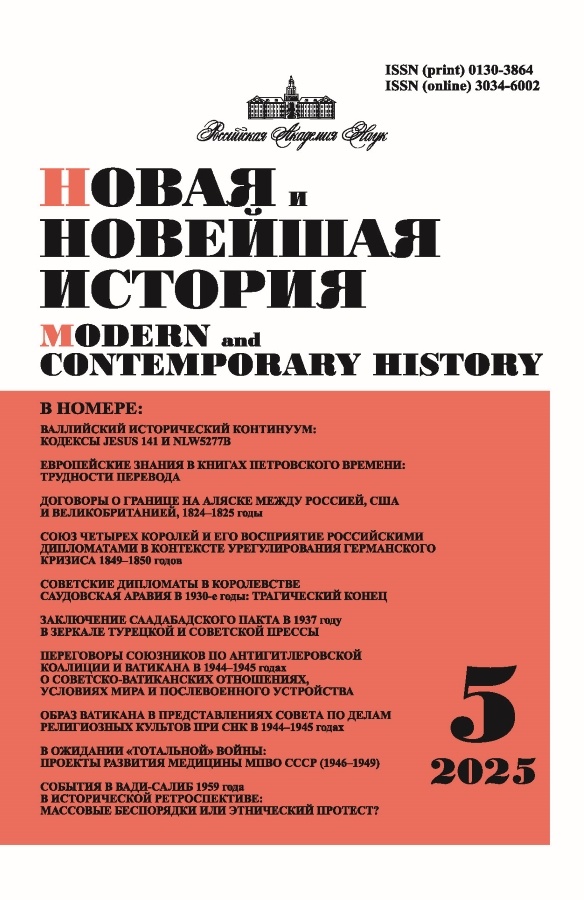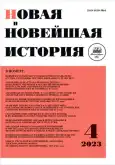«Наш мир только что отыскал еще один мир»: как открытие Нового Света повлияло на историческое сознание французских гуманистов XVI века
- Авторы: Самотовинский Д.В.1
-
Учреждения:
- Ивановский государственный химико-технологический университет
- Выпуск: № 4 (2023)
- Страницы: 72-81
- Раздел: Великие географические открытия и культура возрождения
- URL: https://gynecology.orscience.ru/0130-3864/article/view/670975
- DOI: https://doi.org/10.31857/S013038640025169-3
- ID: 670975
Цитировать
Полный текст
Аннотация
В статье рассматривается влияние открытия Нового Света на историческое сознание французских гуманистов XVI в. Исследование латинских трактатов Ж. Фернеля (1548), Ж. Бодена (1566), французских сочинений Л. Ле Руа (1567, 1575) и М. де Монтеня (1580, 1588) позволяет оспорить утвердившееся в историографии представление, согласно которому открытие Нового Света, высокая оценка новых достижений (компас, артиллерия, книгопечатание) привели гуманистов не только к осознанию превосходства своего времени над античной эпохой, но и к «идее прогресса». Действительно, французские гуманисты (Форнель, Боден, Ле Руа), ссылаясь на современные географические открытия и беспрецедентные изобретения, провозгласили превосходство своей эпохи над античностью в познании мира, заявили, что их современники вышли за рамки античного опыта, познали весь Земной шар и впервые превратили мир в единое пространство обмена и торговли. Критическая позиция М. де Монтеня, оспаривавшего исчерпывающий характер современных географических открытий и новаторский характер ряда изобретений, не получила распространения, поскольку не отвечала потребности гуманистов в высокой исторической самооценке. Именно эта потребность заставляла интеллектуалов эпохи сопоставлять «этот наш век» и античность и убеждаться в превосходстве современности. Однако идея превосходства современной эпохи так и не переросла в культуре французского гуманизма в «идею прогресса». Эта сложная концепция, согласно которой человечество последовательно движется к желаемому образу будущего, была для гуманистов и излишней (с точки зрения удовлетворения потребности в высокой исторической самооценке), и не соответствующей их картине мира. Условия для рождения «идеи прогресса» возникли лишь в XVIII в. в рамках культуры Просвещения. Понимание гуманистами истории основывалось на идее цикличности, представлении о том, что человеческая цивилизация, возникнув, периодически достигает расцвета, а затем неминуемо приходит в упадок. Об этом свидетельствовал весь доступный гуманистам исторический опыт.
Ключевые слова
Об авторах
Дмитрий Владимирович Самотовинский
Ивановский государственный химико-технологический университетРоссийская Федерация, Иваново
Список литературы
- Баткин Л.М. Итальянское Возрождение в поисках индивидуальности. М., 1989.
- Кудрявцев О.Ф. Миф о «золотом веке» в культуре Возрождения // Личность – идея – текст в культуре Средневековья и Возрождения: сборник научных трудов в честь 65-летия Н.В. Ревякиной. Иваново, 2001. С. 84–91.
- Монтень М. Опыты: в 3-х кн. М.; Л., 1954–1960.
- Окунева О.В. «Антарктическая Франция» в Бразилии: преддверие Религиозных войн во Франции? // Религиозные войны во Франции XVI в. Новые источники, новые исследования, новая периодизация / авт.-сост. Ю. Досси, В.В. Шишкин. СПб., 2015. С. 229–247.
- Ревякина Н.В. Итальянское Возрождение. Гуманизм второй половины XIV – первой половины XV в. Новосибирск, 1975.
- Ревякина Н.В. Колуччо Салютати в споре об античности и современности // Формы исторического сознания от поздней античности до эпохи Возрождения (исследования и тексты). Иваново, 2000. С. 116–130.
- Ревякина Н.В. Человек в гуманизме итальянского Возрождения. Иваново, 2000.
- Ревякина Н.В. Человек и природа у Мишеля Монтеня // Cursor Mundi: Человек Античности, Средневековья и Возрождения / отв. ред. В.М. Тюленев. Вып. 7. Иваново, 2015. С. 191–202.
- Самотовинский Д.В. Знал ли человек Возрождения идею прогресса? (Луи Ле Руа) // Cursor mundi: Человек Античности, Средневековья и Возрождения / отв. ред. В.М. Тюленев. Вып. 12. Иваново, 2021. С. 122–143.
- Самотовинский Д.В. Трактат Луи Ле Руа «Рассуждение о французской и всеобщей истории нашего времени, удивительные события которой кратко изложены» (1567): перевод и комментарий // Cursor mundi: Человек Античности, Средневековья и Возрождения / отв. ред. В.М. Тюленев. Вып. 13. Иваново, 2022. С. 90–114.
- Тарле Е.В. Очерки истории колониальной политики западноевропейских государств (конец XV – начало XIX в.). М.; Л., 1965.
- Atkinson G. La littérature géographique française de la Renaissance: Répertoire bibliographique. Paris, 1936.
- Atkinson G. Les nouveaux Horizons de la Renaissance française. Paris, 1935.
- Baron H. The Querelle of the Ancients and the Moderns as a Problem for Renaissance Scholarship // Journal of the History of Ideas. 1959. Vol. 20. № 1. P. 3–22.
- Bejczy I.P. Erasmus and the Middle Ages: the Historical Consciousness of a Christian Humanist. Boston, 2001.
- Bodinus J. Methodus ad facilem historiarum cognitionem. Genevae, 1610.
- Bonnichon Ph. Des Cannibales aux castors: les découvertes françaises de l’Amérique (1503–1788). Paris, 1994.
- Bourne E. The Naming of America // The American Historical Review. 1904. Vol. 10. № 1. P. 45–48.
- Bury J.B. The Idea of Progress: An Inquiry into its Origin and Growth. London, 1920.
- Delumeau J. La peur en Occident, XVIe–XVIIIe siècles: une cité assiégée. Paris, 1980.
- Fernel J. Jean Fernel’s On the Hidden Causes of Things: Forms, Souls, and Occult Diseases in Renaissance Medicine. With an edition and translation of Fernel's De abditis rerum causis by John M. Forrester / eds J.M. Forrester, J. Henry. Leiden, 2005.
- Gadoffre G. La révolution culturelle dans la France des Humanistes: Guillaume Budé et François Ier. Genève, 1997.
- Gilmore M.P. The New World in French and English Historians of the Sixteenth Century // First Images of America: The Impact of the New World on the Old: in 2 vol. Vol. 2 / ed. F. Chiappelli. Berceley, 1976. P. 519–528.
- Le Roy L. De la vicissitude ou variété des choses en l’univers (1575) / éd. par P. Desan. Paris, 1988.
- Losse D. Rewriting Culture: Montaigne Recounts New World Ethnography // Neophilologus. 1999. Vol. 83. № 4. P. 517–528.
- McLaughlin M.L. Humanist Concepts of Renaissance and Middle Ages in the Tre- and Quattrocento // Renaissance Studies. 1988. Vol. 2. № 2. P. 131–142.
- Plattard J. Guillaume Budé (1468–1540) et les origines de l'humanisme français. Paris, 1927.
- Rubiés J.-P. The Discovery of New Worlds and Sixteenth-Century Philosophy // Routledge Companion to Sixteenth Century Philosophy / eds H. Lagerlund, B. Hill. New York, 2017. P. 54–82.
- Weisinger H. Ideas of History during the Renaissance // Journal of the History of Ideas. 1945. Vol. 6. P. 417–424.
Дополнительные файлы








